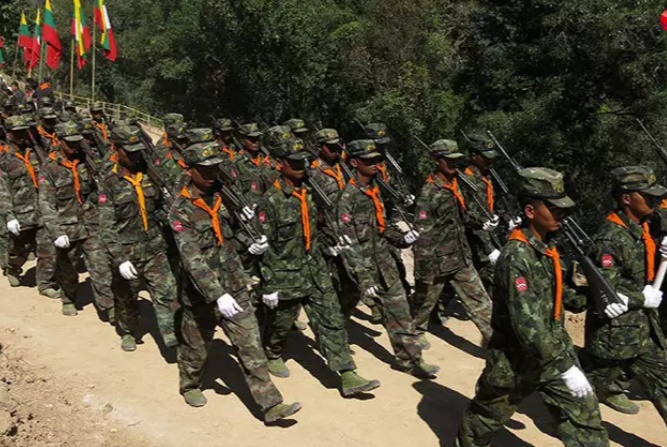Warring Shan Armed Groups Agree to Ceasefire

![]()
News Desk:
Following extended periods of conflict, two ethnic armed groups in Shan State have agreed to sign a ceasefire according to a statement released jointly by the two groups.
The Shan State Army-North, the armed wing of the Shan State Progress Party (SSPP) and the Shan State Army-South, the armed wing of the Restoration Council of Shan State (RCSS) issued a joint statement on Saturday outlining a four-point agreement made by both sides to order their ground forces to cease fighting. Also in the ceasefire conditions, both sides agreed to continue ongoing peaceful negotiations; not to attack each other indirectly using social media; and to work together to eliminate the illicit drug trade.
“Our statement is intended to end fighting between the two Shan armed groups. We had to negotiate several times to be able to issue this ceasefire statement,” Sai Su, lieutenant-colonel and spokesperson for the SSPP told The Irrawaddy on Monday.
Fighting between the two armed groups has given Shan State a bad image and damaged the property of the Shan people, Sai Su added.
Both the RCSS and the SSPP most recently met for negotiations in late April.
Fighting between the two armed groups originally broke out over territorial disputes and many locals have been displaced as a result of the armed conflict which also caused the deaths of young children.
The areas where the sides have ongoing disputes over territory include Namtu, Kyaukme, Hsipaw, and Kyethi townships.
Col. Sai Ngern, a spokesperson for the RCSS confirmed to The Irrawaddy on Monday that they will continue to hold discussions on territory into the future.
“Our Shan [people] asked us to stop fighting. Even we understand that fighting each other has no advantages,” he said.
He also said that this current political platform, especially with a view to building a federal system, is important for the Shan people.
“Our actions (ceasefire) will benefit all people, not only our organizations,” he said.
A number of Shan political parties, community service organizations (CSOs) and internally displaced persons (IDPs) have long been requesting that the two armed groups stop fighting, but it has not been possible until now.
Sai Aik Pao, head of Shan Nationalities Development Party (SNDP) and former chairperson of the Committee for Shan State Unity, said he wrote three letters to both armed groups requesting that they meet for peace talks.
He described the current ceasefire agreement as a success for the ethnic Shan people.
Shan Buddhist monks took the role of peace brokers between the two sides, according to Sai Aik Pao, and the groups ultimately agreed to a ceasefire upon the official request of Maing Hpone Sayadaw.
Maing Hpone Sayadaw is a well-known and highly respected Shan Buddhist monk.
Sai Aik Pao said armed conflict costs human lives, and their fighting particularly affected—even causing the deaths of—their own Shan people, as those living in areas controlled by both sides are Shan.
“It was not good to have fighting in the [Shan] brotherhood. What they really need is to negotiate,” he said.
Sai Tun Aung Lwin, an ethnic Shan journalist and researcher of armed conflict in Myanmar, said that it was good to see both of them agree to a ceasefire.
“The Shan people make up the ethnic majority in Shan State so it was sad to see them fighting each other. The Shan need to start building unity [with each other] before they try to build unity with other ethnic groups in Shan State,” he said.
For a continued and stable ceasefire, peace monitoring mechanisms need to be put in place as well as the relocation of army bases. Territorial disputes need to be settled, Sai Tun Aung Lwin said.